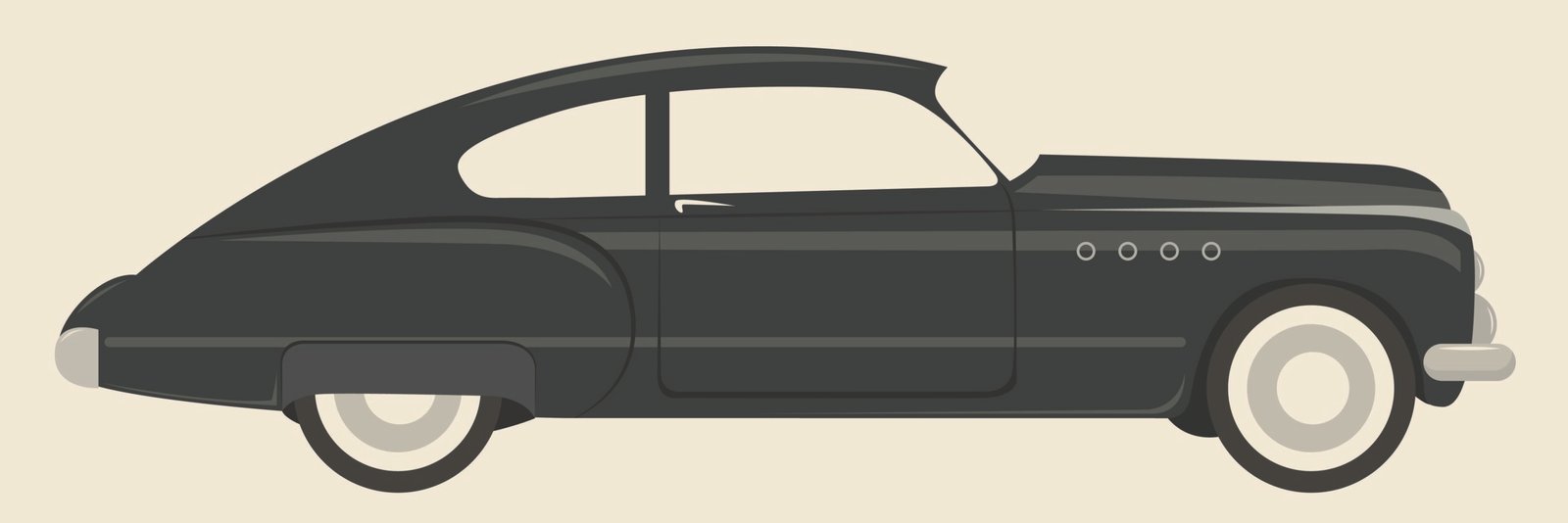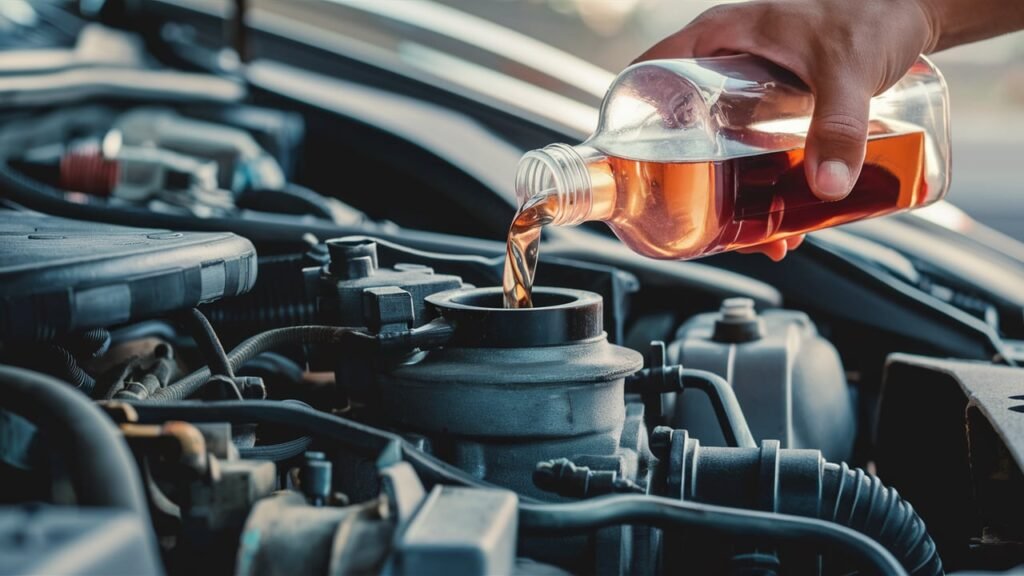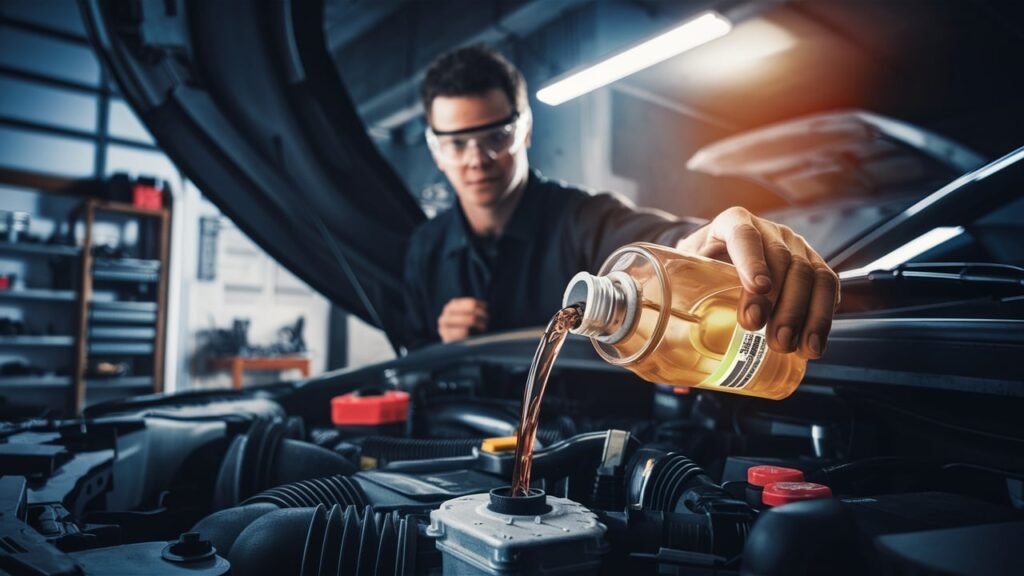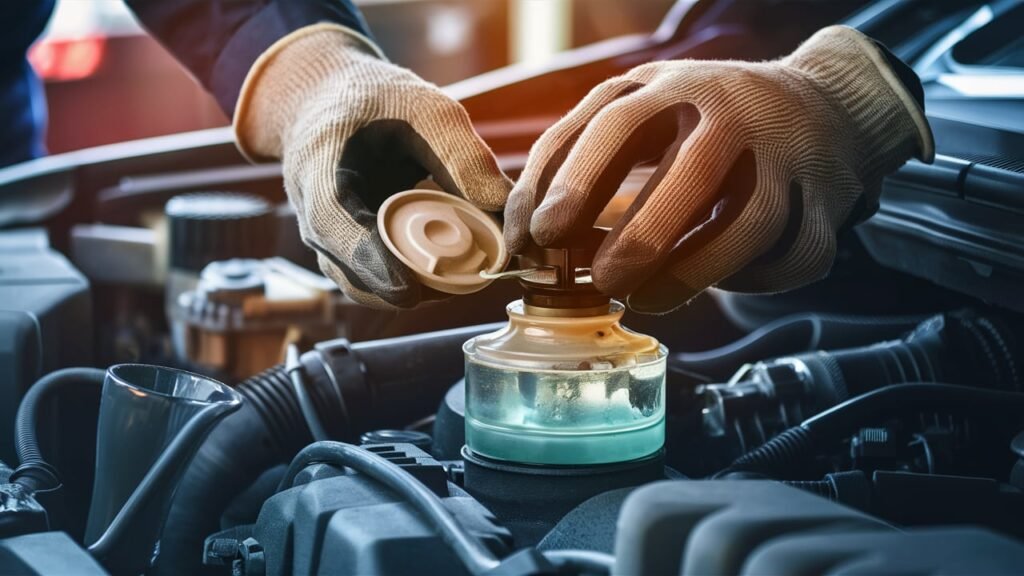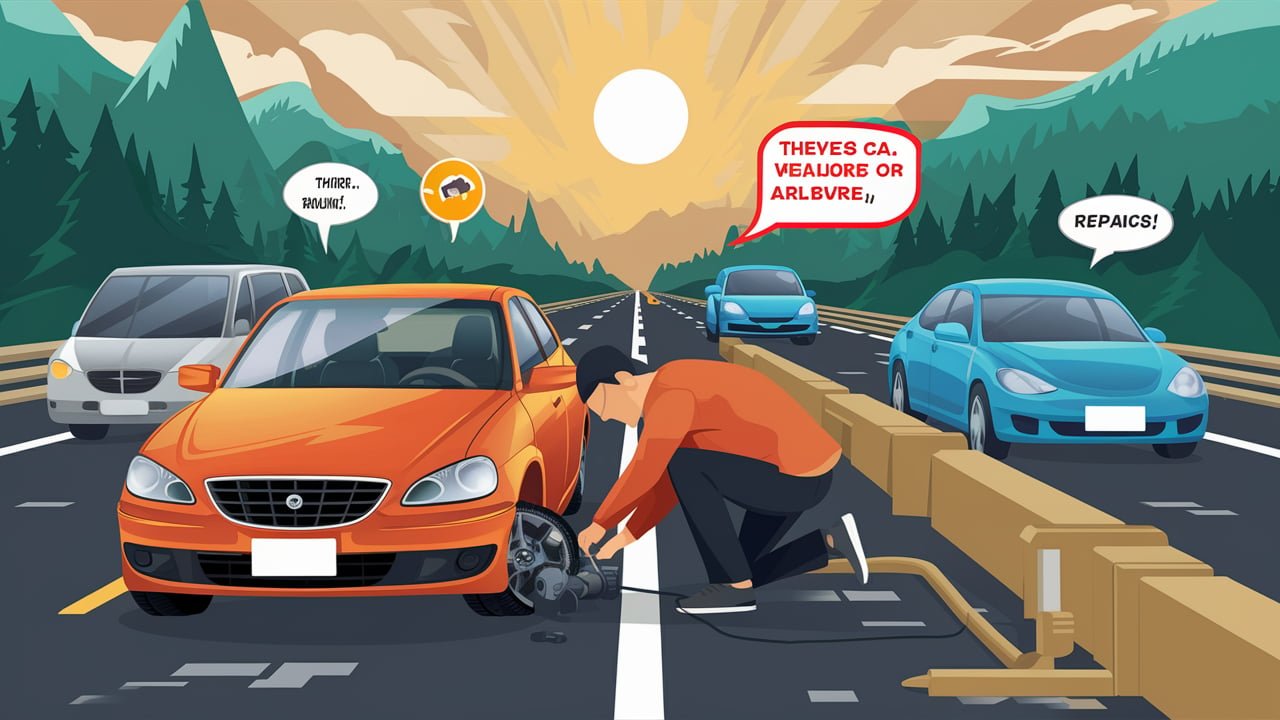
8 Possible Reasons Why Your Car Engine Shuts Off While Driving
Why It shuts down while driving:
If your car engine shuts off while driving, there are several possible reasons for this issue. Here are eight common causes:
Faulty Crankshaft Position Sensor: The crankshaft position sensor monitors the engine’s moving parts and sends data to the Engine Control Unit (ECU). If it fails, the ECU may not receive the correct information, causing the engine to misfire and shut off.
Faulty Spark Plugs: Spark plugs ignite the air-fuel mixture in the combustion chamber. If multiple spark plugs malfunction, the engine may stall and shut off while driving.
Fuel Pump Issues: The fuel pump supplies gasoline to the engine. If it fails or is clogged, the engine may not receive enough fuel, causing it to shut off.
Alternator Problems: The alternator generates electricity to power the car’s systems. If it fails or is malfunctioning, the engine may shut off due to a lack of power.
Ignition Switch Issues: The ignition switch controls the flow of power to the engine. If it fails or is faulty, the engine may not start or shut off while driving.
Idle Control Valve Problems: The idle control valve regulates the engine’s idle speed. If it fails or is malfunctioning, the engine may stall and shut off.
Other Engine Sensors: Various sensors, such as the oxygen sensor and engine speed sensor, help the ECU manage the engine’s performance. If any of these sensors fail, it can cause the engine to shut off.
Engine Overheating: Engine overheating can occur due to various reasons like coolant leaks, radiator issues, or faulty thermostats. If the engine overheats, it may shut off to prevent further damage.
To prevent and address these issues, it is essential to maintain your car regularly, check for signs of trouble, and address problems promptly.
The gentle hum of a well-tuned engine can be music to the ears of any driver, but what happens when that reassuring sound suddenly falls silent while cruising down the road? The abrupt cessation of an automobile’s powerplant mid-journey can signal a range of potential issues that may puzzle even the most seasoned car owners.
Delving into the intricate workings of modern vehicles, we embark on a journey to uncover the enigmatic reasons behind why your car engine shuts off unexpectedly during driving, unlocking a realm where mechanical intricacies meet the art of problem-solving.
In the realm of automotive conundrums, few scenarios are as perplexing and potentially hazardous as experiencing an engine shutdown in motion. Beyond being an inconvenience, this occurrence raises critical concerns for both driver safety and vehicle longevity.
Identifying the underlying causes behind such stoppages not only safeguards passengers and fellow road users but also serves as a proactive approach towards preserving your automobile’s optimal performance.
As we navigate through eight possible explanations for these unsettling engine disruptions, unraveling the mysteries hidden under the hood becomes not just a matter of curiosity but a vital aspect of responsible vehicle maintenance. Welcome to a world where technical expertise meets practical solutions; fasten your seatbelt as we explore why your car’s heart may skip a beat while you’re on the go.
Faulty Ignition System.
When your car engine shuts off while driving, one of the potential reasons could lie within the ignition system components. The ignition system is crucial for initiating combustion within the engine cylinders, and any malfunction can disrupt this process, resulting in sudden shutdowns.
Components like spark plugs, ignition coils, or even the ignition switch can develop issues over time, affecting engine performance. For example, if a spark plug fails to produce a spark at the right moment, it can lead to misfires or complete engine stoppage. To diagnose such issues, mechanics often perform tests using specialized tools to check for proper spark delivery and resistance levels in the ignition components.

Fuel System ProblemsAnother common culprit behind an engine shutting off unexpectedly could be related to fuel system irregularities. A failing fuel pump, contaminated fuel supply, or clogged filters can impede the flow of fuel to the engine, causing operational disruptions.
Symptoms of fuel system problems may include difficulty starting the engine, poor acceleration, or stalling while driving. By understanding these signs and symptoms, drivers can better identify when their car’s fuel system might be at fault. Troubleshooting steps typically involve checking fuel pressure levels using a gauge and inspecting filters for debris accumulation that could obstruct proper fuel delivery.
Overall, being aware of potential issues with both the ignition and fuel systems is essential in maintaining a safe and reliable driving experience. Regular inspections by qualified automotive professionals can help preemptively detect underlying problems before they escalate into major faults leading to abrupt engine shutdowns on the road.
By staying informed about these technical aspects of your vehicle’s functionality and taking proactive maintenance measures, you can minimize the risk of encountering unexpected engine failures during your journeys behind the wheel.
Electrical System Malfunctions.
In the realm of automotive troubleshooting, electrical system malfunctions represent a common underlying cause for engine shutdowns while driving. A failing battery or alternator can swiftly turn a smooth ride into an abrupt halt as the engine loses power.
A struggling battery may fail to provide sufficient electricity to vital components, leading to engine cuts at the most inconvenient times. Understanding testing methods is crucial in pinpointing whether battery health is the culprit behind these sudden stops.
Voltage tests and load testing can assess if your battery is up for the challenge or requires replacement. Similarly, a faltering alternator can contribute to engine shutdowns when it fails to keep the battery charged during operation. Regular inspection and replacement of worn-out batteries and alternators are essential preventative measures.
Moving on to wiring faults, underestimating the impact of damaged wires or faulty connections within your vehicle’s intricate network can lead to intermittent engine stalling episodes that jeopardize safety on the road.

Due diligence in visually inspecting wiring harnesses periodically can reveal frayed wires, corroded connectors, or loose terminals that may disrupt electrical flow and hamper engine performance. Simple visual cues such as exposed wiring or signs of overheating in connection points merit immediate investigation to prevent potential stalling scenarios during your journey.
Restoring proper connectivity through repair or replacement of compromised wiring components is imperative in maintaining the reliable functionality of your vehicle’s electrical system.
In essence, addressing issues within the electrical system holds paramount importance in ensuring uninterrupted driving experiences. By acknowledging how battery abnormalities and wiring deficiencies can trigger sudden engine shutdowns, drivers equip themselves with valuable insights into maintaining their vehicles’ operational integrity.
Implementing proactive measures such as regular inspections and timely replacements safeguards against unforeseen disruptions caused by unexpected electrical glitches.
Remember, bolstering your awareness of these intricacies empowers you to navigate road challenges with confidence and resilience while safeguarding both personal safety and vehicular longevity from undue interruptions caused by electrical anomalies.
Engine Overheating Concerns.
Engine overheating is a serious issue that can lead to sudden engine shutdowns, posing safety risks and potentially causing significant damage to the vehicle. Cooling system failures are often at the core of overheating problems.
Coolant leaks, whether from hoses, the radiator, or the water pump, can result in insufficient cooling fluid reaching the engine. In such cases, inadequate heat dissipation may force the engine into an automatic shutdown mode to prevent catastrophic damage.
Regularly checking for signs of coolant leakage and promptly addressing any issues through repairs or replacements is crucial in maintaining proper cooling system function.
Thermostat problems are another common culprit behind engine overheating and subsequent shutdowns while driving. A malfunctioning thermostat can disrupt the regulated flow of coolant between the engine and radiator, leading to erratic temperature control within the system.

As a result, overheating episodes may occur unexpectedly during operation, triggering the engine’s shut off mechanism as a protective measure against severe overheating-related damage. Ensuring that the thermostat is functioning correctly through periodic checks and timely replacements when needed is essential for preventing these disruptions in cooling system operation.
Maintaining a well-functioning cooling system and monitoring components like thermostats play vital roles in preventing engine overheating incidents that could result in sudden shutdowns on the road.
By staying attentive to signs of coolant leaks, irregular temperature gauge readings, or any unusual behavior related to cooling processes, car owners can proactively address potential issues before they escalate into critical malfunctions.
Regular inspection and servicing of these components not only contribute to a safe driving experience but also extend the longevity of the vehicle by mitigating risks associated with engine shutdowns due to overheating concerns.
Sensor and Computer Errors.
In modern vehicles, sensors play a crucial role in ensuring the precise functioning of various systems, including the engine. When the crankshaft position sensor malfunctions, it can severely impact the engine’s operation.
This sensor is responsible for monitoring the position and rotational speed of the crankshaft, providing vital information to the engine control unit (ECU) for proper timing and fuel delivery. If this sensor fails, it can lead to erratic engine behavior, misfires, or even sudden shutdowns while driving.
To diagnose such issues, specialized diagnostic tools that read sensor data and pinpoint irregularities are often used. Replacement of a faulty crankshaft position sensor typically involves locating it on the engine block, disconnecting electrical connectors, removing mounting bolts, and installing a new sensor following manufacturer specifications.
On the other hand, problems within the ECU can also trigger unexpected engine shut offs. The ECU serves as the brain of the vehicle’s electronic systems, controlling fuel injection timing, ignition timing, and various other functions essential for smooth engine operation.
Programming errors or hardware faults within the ECU can disrupt these processes and cause the engine to suddenly stop running. These glitches might manifest as intermittent stalling or complete power loss while driving.
In cases where ECU-related issues are suspected, seeking professional diagnosis from qualified technicians with access to advanced diagnostics tools is recommended. Depending on the problem identified – whether software-related or a faulty hardware component within the ECU – appropriate corrective actions like reprogramming or ECU replacement may be necessary to restore normal engine function.
Addressing sensor and computer errors concerning crankshaft position sensors and ECU glitches is pivotal when troubleshooting instances of engine shutdowns during driving. Understanding how these components operate within your vehicle’s intricate system can help car owners better grasp potential causes behind such disruptions.
By recognizing signs indicative of sensor or ECU malfunctions early on and taking prompt action through diagnostic measures or expert intervention, drivers can mitigate risks associated with sudden engine failure on the road. Regular maintenance schedules that include checking these critical components will aid in preventing unforeseen breakdowns related to sensor and computer errors in vehicles.
Mechanical Component Breakdowns.
When considering potential reasons for your car engine shutting off while driving, mechanical component breakdowns like timing belt or camshaft failures are critical factors to explore. The timing belt and camshaft play pivotal roles in synchronizing the movement of various engine components.
If a timing belt snaps or a camshaft malfunctions during operation, it can lead to significant damage and result in sudden engine shutdown. To prevent such issues, regular maintenance is crucial. Scheduled timing belt replacements based on manufacturer recommendations can significantly reduce the risk of unexpected engine failure caused by these components.
Another mechanical culprit that can cause your car’s engine to shut off unexpectedly is vacuum leaks. Vacuum leaks disrupt the proper functioning of the engine by allowing extra air to enter the system, throwing off the air-fuel mixture ratio necessary for combustion.
When this balance is disturbed, the engine may stall while driving. Identifying vacuum leaks involves meticulous inspection of hoses, gaskets, and intake manifold areas for signs of wear or damage. Promptly addressing any detected leaks through repair or replacement of affected parts can help restore optimal engine performance and prevent further shutdown incidents.
In essence, addressing mechanical component breakdowns such as timing belt/camshaft failures and vacuum leaks requires proactive maintenance practices and keen attention to system integrity.
By staying vigilant with scheduled maintenance intervals recommended by vehicle manufacturers and conducting thorough inspections for signs of wear or malfunction in critical components like the timing system and vacuum lines, car owners can mitigate the risks associated with sudden engine shutdowns while driving. Engaging in preventive measures ensures better reliability and longevity for your vehicle’s powertrain systems.
Conclusion.
In understanding the complexities of why a car engine might shut off while driving, it becomes evident that numerous technical factors can contribute to this potentially hazardous situation.
By delving into the realms of ignition systems, fuel system intricacies, electrical malfunctions, overheating concerns, sensor and computer errors, and mechanical component breakdowns, drivers and automotive enthusiasts can better grasp the multifaceted nature of engine shutdown incidents.
Identifying possible reasons for sudden engine cuts serves not only as a means of enhancing vehicle maintenance practices but also as an essential measure for ensuring on-road safety.
Through meticulous troubleshooting methods outlined in this comprehensive guide, individuals can navigate the intricate web of potential culprits behind erratic engine behaviors with clarity and precision.
By fostering a deeper comprehension of these technical intricacies, drivers empower themselves to proactively address issues that could compromise both their driving experience and overall safety on the road.
